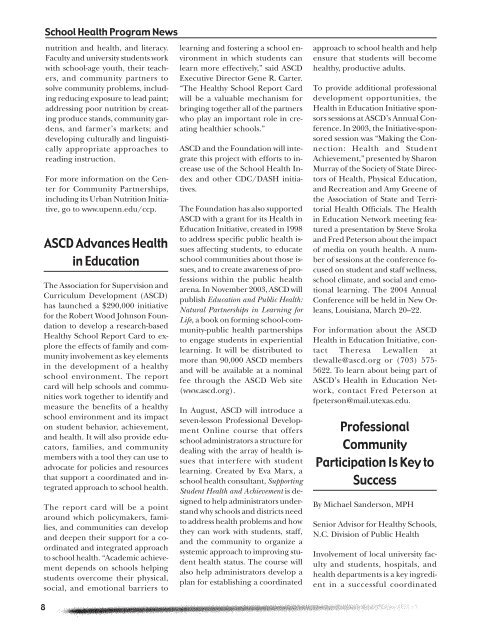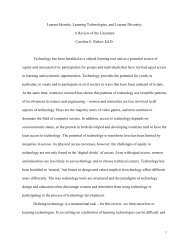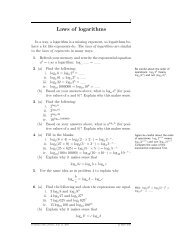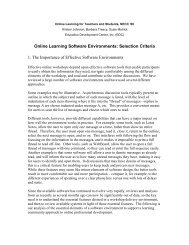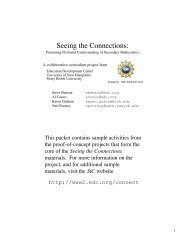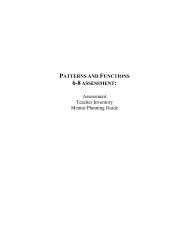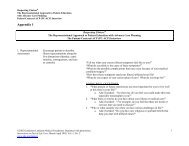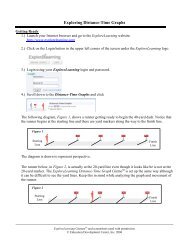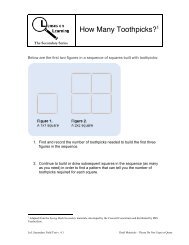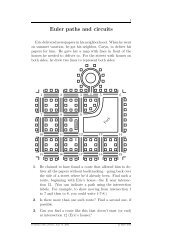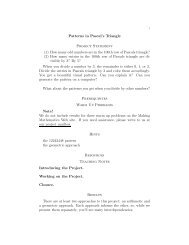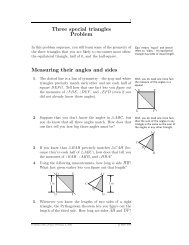School Health Program News - Education Development Center
School Health Program News - Education Development Center
School Health Program News - Education Development Center
You also want an ePaper? Increase the reach of your titles
YUMPU automatically turns print PDFs into web optimized ePapers that Google loves.
<strong>School</strong> <strong>Health</strong> <strong>Program</strong> <strong>News</strong>nutrition and health, and literacy.Faculty and university students workwith school-age youth, their teachers,and community partners tosolve community problems, includingreducing exposure to lead paint;addressing poor nutrition by creatingproduce stands, community gardens,and farmer’s markets; anddeveloping culturally and linguisticallyappropriate approaches toreading instruction.For more information on the <strong>Center</strong>for Community Partnerships,including its Urban Nutrition Initiative,go to www.upenn.edu/ccp.ASCD Advances <strong>Health</strong>in <strong>Education</strong>The Association for Supervision andCurriculum <strong>Development</strong> (ASCD)has launched a $290,000 initiativefor the Robert Wood Johnson Foundationto develop a research-based<strong>Health</strong>y <strong>School</strong> Report Card to explorethe effects of family and communityinvolvement as key elementsin the development of a healthyschool environment. The reportcard will help schools and communitieswork together to identify andmeasure the benefits of a healthyschool environment and its impacton student behavior, achievement,and health. It will also provide educators,families, and communitymembers with a tool they can use toadvocate for policies and resourcesthat support a coordinated and integratedapproach to school health.The report card will be a pointaround which policymakers, families,and communities can developand deepen their support for a coordinatedand integrated approachto school health. “Academic achievementdepends on schools helpingstudents overcome their physical,social, and emotional barriers tolearning and fostering a school environmentin which students canlearn more effectively,” said ASCDExecutive Director Gene R. Carter.“The <strong>Health</strong>y <strong>School</strong> Report Cardwill be a valuable mechanism forbringing together all of the partnerswho play an important role in creatinghealthier schools.”ASCD and the Foundation will integratethis project with efforts to increaseuse of the <strong>School</strong> <strong>Health</strong> Indexand other CDC/DASH initiatives.The Foundation has also supportedASCD with a grant for its <strong>Health</strong> in<strong>Education</strong> Initiative, created in 1998to address specific public health issuesaffecting students, to educateschool communities about those issues,and to create awareness of professionswithin the public healtharena. In November 2003, ASCD willpublish <strong>Education</strong> and Public <strong>Health</strong>:Natural Partnerships in Learning forLife, a book on forming school-community-publichealth partnershipsto engage students in experientiallearning. It will be distributed tomore than 90,000 ASCD membersand will be available at a nominalfee through the ASCD Web site(www.ascd.org).In August, ASCD will introduce aseven-lesson Professional <strong>Development</strong>Online course that offersschool administrators a structure fordealing with the array of health issuesthat interfere with studentlearning. Created by Eva Marx, aschool health consultant, SupportingStudent <strong>Health</strong> and Achievement is designedto help administrators understandwhy schools and districts needto address health problems and howthey can work with students, staff,and the community to organize asystemic approach to improving studenthealth status. The course willalso help administrators develop aplan for establishing a coordinatedapproach to school health and helpensure that students will becomehealthy, productive adults.To provide additional professionaldevelopment opportunities, the<strong>Health</strong> in <strong>Education</strong> Initiative sponsorssessions at ASCD’s Annual Conference.In 2003, the Initiative-sponsoredsession was “Making the Connection:<strong>Health</strong> and StudentAchievement,” presented by SharonMurray of the Society of State Directorsof <strong>Health</strong>, Physical <strong>Education</strong>,and Recreation and Amy Greene ofthe Association of State and Territorial<strong>Health</strong> Officials. The <strong>Health</strong>in <strong>Education</strong> Network meeting featureda presentation by Steve Srokaand Fred Peterson about the impactof media on youth health. A numberof sessions at the conference focusedon student and staff wellness,school climate, and social and emotionallearning. The 2004 AnnualConference will be held in New Orleans,Louisiana, March 20–22.For information about the ASCD<strong>Health</strong> in <strong>Education</strong> Initiative, contactTheresa Lewallen attlewalle@ascd.org or (703) 575-5622. To learn about being part ofASCD’s <strong>Health</strong> in <strong>Education</strong> Network,contact Fred Peterson atfpeterson@mail.utexas.edu.ProfessionalCommunityParticipation Is Key toSuccessBy Michael Sanderson, MPHSenior Advisor for <strong>Health</strong>y <strong>School</strong>s,N.C. Division of Public <strong>Health</strong>Involvement of local university facultyand students, hospitals, andhealth departments is a key ingredientin a successful coordinated8


